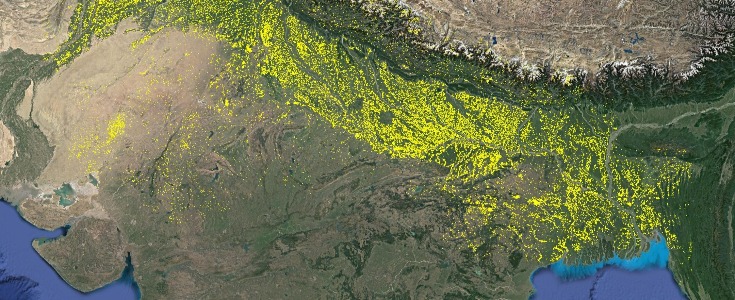Measurement and Geographies Programme
How many people are enslaved in the world and where are they?

To tackle modern slavery, we need to know how many people are enslaved, where they are and their geographies. Robust measurement and analysis give us the foundations from which to build effective action: governments need to be able to measure slavery prevalence in order to design and resource appropriate policy responses; an accurate understanding of the location and prevalence of slavery can help NGOs plan more effective programmes on the ground; and businesses benefit from understanding slavery prevalence linked to particular commodities.
In our Measurement and Geographies Programme, geographers, political scientists, sociologists, mathematicians, environmental scientists, development studies experts and business systems specialists have made globally recognised advances in measuring the risk and prevalence of modern slavery and understanding the geographies in which modern slavery occurs. Geographies of modern slavery offer an understanding of what drives modern slavery and its impacts in space and time. Using a mixed methods approach, including machine-learning, scenario modelling, qualitative surveys and citizen science, we measure and contextualise slavery.
For example, our Slavery from Space initiative uses geospatial observation to map and measure slavery. We now estimate that more of a third of the world’s slavery is visible from space. Working with data providers, imagery analysts and AI experts, we are harnessing the value of satellite data for anti-slavery action: analysing imagery to find and predict the locations of high slavery-prevalence industries and hotspots.
For example, we have used satellite remote sensing data to:
-
Provide a rigorous estimate of the number of brick kilns, known to be sites of modern slavery, across the ‘Brick Belt’ that runs across south Asia;
-
Assess the relationship between tree loss and modern slavery across four countries, Brazil, Ghana, Indonesia and Mozambique;
-
Monitor fluctuations in the location and number of informal settlements in southern Greece where migrant labourers were in conditions of labour exploitation;
-
Map and track artisanal cobalt mining activities known to use child labour in the Democratic Republic of Congo over a ten-year period.
One focus for this programme is how to identify and assess the environmental impact of modern slavery and the climate change nexus. Modern slavery activities create, exacerbate, and are shaped by climate change and environmental degradation. This includes mapping the ecological dimensions of human vulnerability to modern slavery and the synchronous occurrence of environmental degradation and modern slavery in agricultural, forest, marine, and freshwater ecosystems. We identify modern slavery risk factors in specific settings, used applied social-ecological systems approach and mixed methods to construct longitudinal prevalence estimates for key sectors, and help to develop mitigation strategies.
Programme experts
- Description
- Rights Lab Associate Director (Measurement and Geographies Programme) and Professor of Earth Observation
- Description
- Rights Lab Professor of Contemporary Slavery
- Description
- Senior Research Fellow in Geography and Rights Lab Lead in Decent Work and Climate Change Risks
- Description
- Rights Lab Senior Research Fellow in Social Sustainability and Complex Systems
- Description
- Rights Lab Research Fellow in Machine Learning and PhD Student in Geospatial Systems
- Description
- Rights Lab Research Associate in Earth Observation and Geospatial Data Science
- Description
- Rights Lab Geospatial Scientist for Prevalence in Modern Slavery
- Description
- Rights Lab Research Fellow in Social Science Quantitative Analyses
- Description
- Rights Lab Research Fellow in Business Practices and Lead in Social Accounting
- Description
- Rights Lab Research Fellow in Slavery and War (Comparative Contexts)
- Description
- Rights Lab Research Associate in Geospatial Data Science and Earth Observation
- Description
- Rights Lab Visiting Professor in Anti-Slavery Ecosystems Data
- Description
- Rights Lab Research Fellow in Forced Labour and Deforestation Data
- Description
- Rights Lab Research Fellow in Socio-Environmental and Climate Law
- Description
- Rights Lab Research Fellow in the Social Production of Space
- Description
- Rights Lab Professor of Geographical Information Science
- Description
- Rights Lab Professor in Business Analytics
- Description
- Rights Lab Data Science Training Lead and Associate Professor in Politics
- Description
- Rights Lab Associate Professor in Business Analytics
- Description
- Rights Lab Visiting Professor of Human Trafficking and Modern Slavery
- Description
- Rights Lab Visiting Professor of Innovation and Impact.
- Description
- Rights Lab Assistant Professor of Environmental Justice
- Description
- Rights Lab Visiting Fellow in Child Trafficking, Survivor Identification and Support
- Description
- Rights Lab Visiting Fellow in Modern Slavery Statistics
- Description
- Rights Lab Visiting Fellow in Human and Labour Rights Measurement and Evaluation
- Description
- Rights Lab Visiting Professor in Human Trafficking Data and Measurement
Back to the top